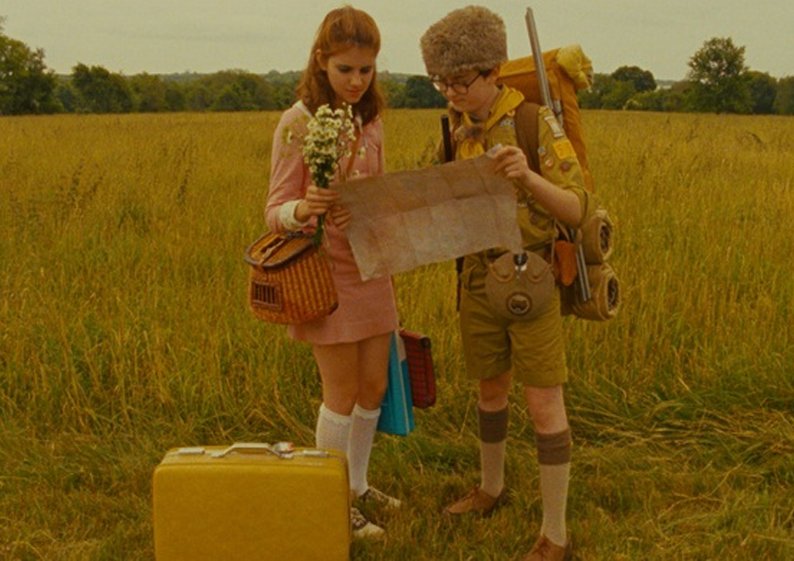


Francesca Wade reviewsMoonrise Kingdom, a beautifully styled, charming film and one of the main inspirations behind our Early Spring shoot.
What kind of a bird are you?' It's an unconventional opening line, but at the centre of Wes Anderson's glorious film lies an unconventional romance. The question is uttered by a young, bespectacled Scout, who's wandered backstage during a church performance of Benjamin Britten's children's opera Noye's Fludde. Bursting through the costume rail, Sam encounters a line-up of girls perfecting their make-up in the mirror. The others scoff at his question, but Suzy who, as it happens, is dressed as a raven doesn't laugh.
Moonrise Kingdom is the story of these two intelligent, sensitive outcasts, written off as troubled children', and their attempt to spread their wings and fly as freely as birds away from infuriated adults and taunting peers.
When the film opens in the summer of 1965, one year after this first meeting, 12 year old Sam (Jared Gilman) is at Camp Ivanhoe, the least popular Scout in the troop'. The other boys are cheerfully building tree houses and relish the discipline instilled in them by their scout master, but Sam who is renowned for his excellent wilderness skills' yearns for authentic adventure.
It soon transpires that he and Suzy (Kara Hayward) have been penpals for a year, and have plotted a glorious escape. They meet in a yellow cornfield, not far from Suzy's house, on an isolated New England island called New Penzance. He's brought a stolen canoe, fishing equipment and an air rifle; her suitcase is laden with books, a record player, and her small cat. They pitch camp in a clearing on a beautiful lagoon, and spend the day gathering pebbles from the stream, picnicking on the sand, catching turtles, frying fish, and diving into the azure water.
The luscious scenery lends a nostalgic beauty to their quest; their reliance on ingeniously contrived survival mechanisms' belies a poignant sense that for them, this escape is a form of survival. As the long afternoon turns to dusk, they dance in their underwear on the beach to Francoise Hardy, and experiment, tentatively, with French kissing. As innocence melts into experience, against the picture-perfect sunset, the quirky charm is offset by a level of menace: the Khaki Scouts are armed with crossbows and mallets, and are coming along with the island police and Suzy's lawyer parents in pursuit of this misfit couple.
Anderson's characteristically stylised aesthetic full of mechanical stage sets, handwritten letters and elegant maps tinges the atmosphere with a surreal quality that heightens its whimsical power. The precocity of Sam and Suzy's romance (he smokes a pipe, she wears green eyeshadow) is given pathos by the contrast of its hopefulness the way they accept each other totally, and the unswerving trust of their devotion with the adult world they know.
For Sam, adulthood is the foster parents who don't want him back, and the Social Services (a deliciously menacing Tilda Swinton) whose approach to an emotionally disturbed' orphan is to threaten juvenile refuge and electroshock therapy. For Suzy (whom her parents have deemed a Very Troubled Child'), it's her parents' unhappy marriage, which manifests in her own violent outbursts, as she feels unloved and misunderstood. The sympathetic adults are the ones who seem not to have grown up: the scout leaders in their incongruous shorts and socks, the police chief (Bruce Willis) who can shimmy up a church steeple in a lightning storm. As the film develops, and the scouts decide to help the star-crossed lovers, the children are united with boundless energy, creativity and panache against an adult world that seeks to restrain them.
Sam and Suzy are united in the curious and hopeful way they look at life Suzy through her binoculars, Sam through his watercolour painting. At dusk, on the island, they read adventure stories aloud: Suzy likes stories with magic powers in them' and usually a girl hero'. Moonrise Kingdom itself is testament to the magic power' of love: it will deservedly live on as a classic.
Words by Francesca Wade.
SaveSave
SaveSave
SaveSave
Add a comment